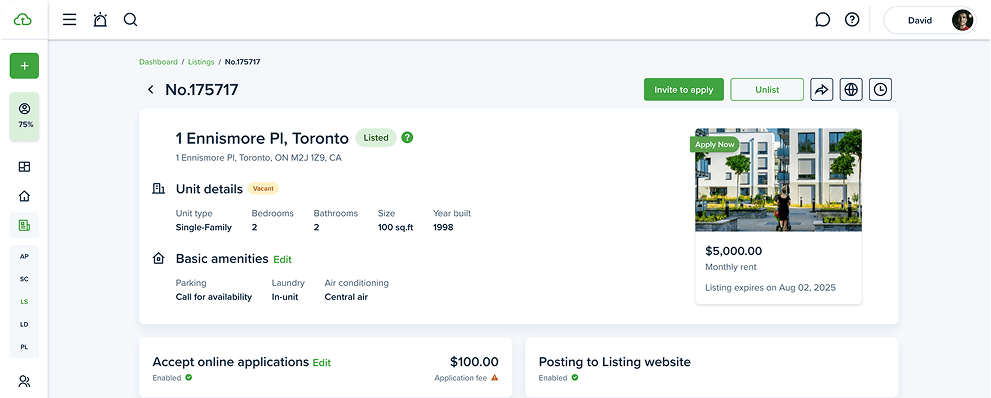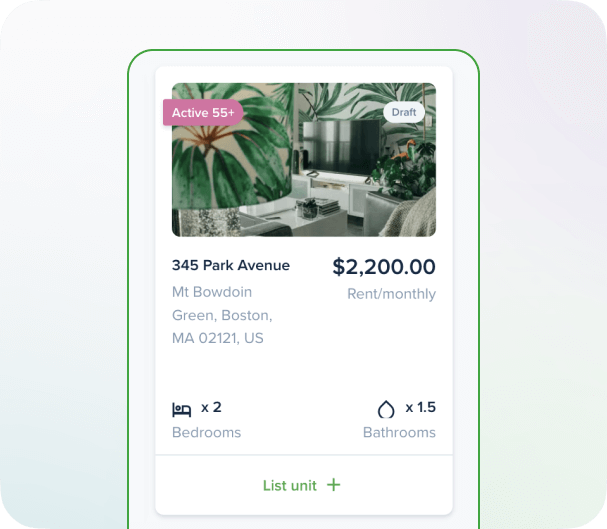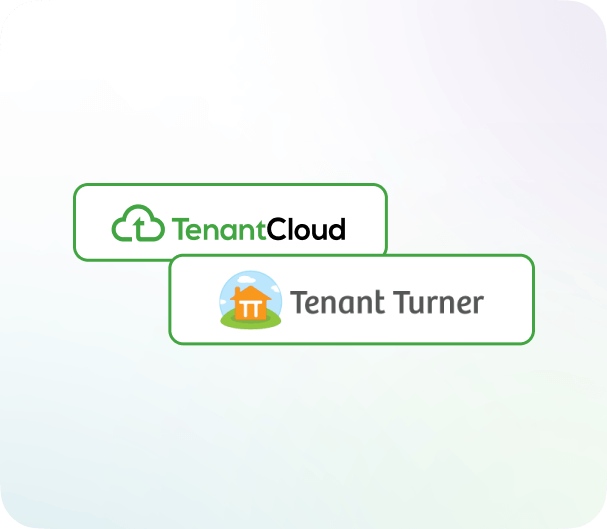Automatic Listing Syndication
Advertise Your Rental Property Faster
List a rental and showcase it on multiple sites at once, gaining more exposure in less time. Landlords who list on TenantCloud receive nearly 4 applications per listing.
List once, syndicate to multiple rental sites for free
Advanced listings for even faster exposure
Receive rental applications right on TenantCloud
Advertise on Rent.com, Redfin, Apartment Guide, and more
- Online Rent Payments
- Maintenance Management
- Listings and Applications
- Enhanced Reporting
- Move In/Out Inspections
- Property Message Board
- Team Management & Tools
- Task Management
- User-Interface Customization
Prices exclude any applicable taxes.
Onboarding available. Onboarding fees apply based on portfolio size.
FAQs
What is rental listing syndication and how does it work?
Rental listing syndication is a feature that automatically publishes your rental property listing across multiple sites at once. Instead of manually posting to each platform, listing syndication saves time and ensures your listing reaches a wider audience.
With TenantCloud’s real estate listing syndication service, your property can appear on trusted sites like Rentler, Tenant Turner, Apartments.com, Zillow, and Realtor.com® - helping you attract more qualified tenants and reduce vacancy time.
Benefits of rental listing syndication for property managers:
- Maximum exposure - Reach renters on multiple rental listing websites with one click. You can also create your own listing site on TenantCloud and receive direct applications.
- Faster tenant placement - More eyes on your rental property means quicker application.
- Reduced listing time - List and re-list easily with TenantCloud's seamless rental property advertising tools.
- Consistent marketing - Make sure each property listing is accurate and matches across all sites.
In a competitive rental market, rental listing syndication is one of the most efficient ways to advertise rental properties and fill vacancies faster.
How can I advertise my rental property for the best visibility?
The best way to advertise your rental property is by posting it on multiple trusted rental listing websites. Use rental listing syndication through a property management platform to publish your listing on multiple sites with one click, increasing exposure in less time.
Want to know where to advertise rental property listings for faster results? Focus on high-traffic sites that have built-in applications and engagement tracking. Platforms like TenantCloud syndicate your listings to popular property listing sites for you, ensuring that your rental appears where tenants are looking.
Whether you want to advertise a house for rent or list an apartment, rental listing syndication improves visibility, attracts better tenants, and reduces vacancy time.
How do I list my rental property with TenantCloud?
With TenantCloud’s advanced listing syndication, you can list your rental property once and promote it across top rental property listing sites.
No more logging into multiple platforms or juggling different image specs and form fields. With TenantCloud's property management software, you can list a rental property and manage it from one place.
What makes our rental listing syndication stand out:
- Pay once, list everywhere – Enjoy 30 days of rental listing syndication with just one payment.
- No extra fees – Reactivate listings anytime during your syndication period without paying extra.
- Smarter flow – Quickly change availability, application settings, or status in the same screen.
- See changes in real-time – Organize and monitor all listing activity, from live to deactivated.
- Custom listing site – Create a visually appealing rental listing site with FAQs, hours, and more.
Whether you’re listing a rental property for the first time or refreshing an old one, TenantCloud helps you market smarter, not harder.
Which rental listing sites does TenantCloud syndicate to?
TenantCloud automatically syndicates to several popular rental listing sites for landlords, helping you advertise rental property more efficiently than ever. The property management platform posts listings to these well-known property listing sites:
- Rentler
- Apartments.com
- Tenant Turner
- Zillow Group
- Realtor.com®
- Rent.com
- Redfin
- RentalAds
- Oodle Marketplace
- RealtyStore
- RentalSource
- Zumper
- and other top real estate syndication websites
TenantCloud aims to connect with the most reliable listing sites available, so property managers can stay listed and active without having to post rental property details over and over.
No need to look up websites to list rental properties or spend time creating multiple logins, just list your property on TenantCloud and syndicate it, and we'll do the rest.
Looking for the best place to advertise rental property online? TenantCloud has you covered. Try it out with a free 14-day trial.
How can I find tenants faster with listing syndication?
Rental listing syndication allows you to publish your property to multiple rental listing websites at once, saving time and expanding your reach. Instead of manually posting on each site, property management software like TenantCloud lets you syndicate your listing in just a few clicks.
When you use TenantCloud's syndication tools, prospective tenants can:
- Submit a rental application directly from the listing.
- Pay the application fee online.
- Complete a screening report, including background checks with 99.9% accuracy.
These features help you find more applicants and reduce the time it takes to go from listing to lease.
Where is the best place to post my rental or room for rent?
The best place to post rental property depends on a variety of factors. The platform you want to advertise on may vary whether you're listing a single-family home or room for rent. Consider who you're trying to reach and where they're searching.
Here are a few tips:
- Rooms for rent often perform well on platforms with local traffic, like Facebook Marketplace, Rentler, Roomster, or even Craigslist.
- Apartments and multi-unit buildings often get more views on Zillow, Apartments.com, or Rent.com.
- Single-family homes are often searched for on realtor.com, Redfin, and Find Houses, RentalAds.
With rental listing syndication, you can post on multiple platforms at once, so you don’t have to guess which ones will work best. Try a property management software like TenantCloud to publish listings on multiple rental listing websites with one click.
What info should I include on my listing website?
When posting a property listing, consider what tenants want to see when searching for a place to rent. Consider including the following:
- Property details - Location, number of bedrooms and bathrooms, square footage, and amenities
- Property description - Make sure the description is nicely written and includes unique features or amenities
- Community details - Neighborhood, local schools, public transportation, shopping, dining, etc.
- Rental policies - Disclose specific requirements for tenants, such as pet policies, tenant screening procedures, minimum lease terms, etc.
- High-quality photos - Take time to include brightly lit photos of the space and any neighbohood amenities
Focus on a few key features that will attract potential renters and make their properties appear their best. Here are some more tips on how to make your listing look even more appealing to renters.



